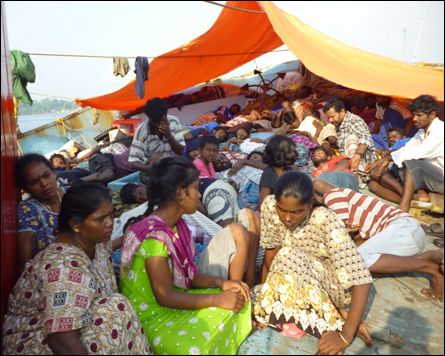In a written submission to the up-coming, 21st session of the UN Human Rights Council, Amnesty International detailed the 'shortcomings in Sri Lanka's National Plan of Action to implement the recommendations of the LLRC'.
The report, entitled 'No Real Will to Account', argued that the lack of accountability had ensured a "climate of impunity where arbitrary detentions, torture and other ill-treatment, enforced disappearances, and custodial killings continue unchecked."
"More than three years after the armed conflict with the Liberation Tigers of Tamil Eelam (LTTE) ended, these violations continue to be reported."
See here for full statement.
Extracts reproduced below:
Resolution 19/2 adopted by the UN Human Rights Council (HRC) on 22 March 2012, was an important development in calling on Sri Lanka to account for serious violations of human rights - including war crimes. Sri Lanka was urged to formulate a “comprehensive action plan” for implementation of recommendations made by its Lessons Learnt and Reconciliation Commission (LLRC), and to “address alleged violations of international law.”
The resolution noted with concern that the final report of the LLRC did “not adequately address serious allegations of violations of international law”
In July 2012, the Sri Lankan government responded with a National Plan of Action (the Plan) which commits to limited implementation of 92 of the LLRC’s 285 recommendations. It outlines activities envisioned, responsible agencies, performance indicators and timeframes.
However the Plan does not adequately address the need for accountability for serious violations of human rights, and it postpones critical reforms needed for reconciliation by referring them to a Parliamentary Select Committee on constitutional reform that does not yet exist.
Accountability activities in the Plan are described vaguely and do not correspond fully with the LLRC’s more precise recommendations for independent investigation and prosecution of human rights and humanitarian law violations. Proposed actions often refer to existing mechanisms or procedures that Amnesty International has documented as ineffective.
The Plan’s greatest weakness is that it relies on agencies associated with violations to investigate and police themselves. Although soldiers, commanding officers and Defence Ministry officials have been accused of involvement in war crimes, the Ministry of Defence is charged with implementing the LLRC recommendation calling for investigation of wrongful deaths of civilians, and also for “allegations of abductions, enforced or involuntary disappearances, and arbitrary detention.”
The Plan does not commit to new or independent investigations; instead it refers to an internal “disciplinary process,” supposedly ongoing under Sri Lanka’s Armed Forces statutes; it rejects the LLRC call for the appointment of a Special Commissioner of Investigation into alleged enforced disappearances.
[more]


.jpg)